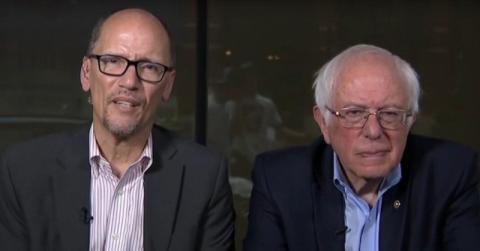Now the Democrats can end Bernie Sanders' presidential campaign before it even begins.
In an unanimous vote on June 8, the DNC Rules and Bylaws Committee gave the Democratic Party the power to block Sen. Bernie Sanders and any other progressive from running in the 2020 Democratic presidential primary.
Passed at a party meeting in Providence, the new rule allows the DNC to screen the candidates who apply to run for president as a Democrat and veto the ones it doesn’t approve of. The candidates that it decides against will be barred from running for president on the party’s ballot line.
LISTEN NOW: DNC Proposes New “Loyalty Oath” to BERN Independents
The new rule gives the DNC sweeping power and control over the primary process, allowing it to handpick which candidates can run months before the voters have cast a single ballot.
The measure codifies a power that the DNC has long asserted to have. When sued for rigging the 2016 presidential primary and defrauding the voters, the Democratic Party defended its actions and argued that it has the right to rig the primaries in 2020 and beyond.
In April 2017, during the fraud lawsuit, the party argued in open court that as a private corporation it has no obligation to provide a fair and impartial primary. The DNC attorney said that the party is at liberty to, “Go into back rooms like they used to and smoke cigars and pick the candidate that way.”
The new rule forces presidential candidates to pledge their loyalty to the party upon declaring their candidacy. It grants a single individual, the DNC chair, sole discretion to strike anti-establishment candidates from the ballot if the chair determines that the candidate’s record of “public writings and/or public statements” do not “affirmatively demonstrate that they are faithful to the interests, welfare and success of the Democratic Party of the United States.”
https://twitter.com/rweingarten/status/1005165874477719553
In effect, this gives DNC Chair Tom Perez the unilateral authority to remove candidates from the party’s presidential ballot in 2020.
Heeding instructions from the party’s donors last year, the DNC members appointed establishment-favorite Tom Perez as DNC chair over Sanders-endorsed candidate Keith Ellison. Perez was a vocal Hillary Clinton supporter during the 2016 presidential primary. He advised the Clinton campaign to cast Sanders as the candidate of whites to turn off people of color.
As party chair, Perez purged progressives from the DNC and ensured that not one Sanders supporter would sit on the important Rules and Bylaws Committee. He will now determine who has been sufficiently “faithful” to the Democratic Party to run for president on its ballot line.
If the donors instruct that Sanders or another progressive be disqualified from running in 2020, Perez and the DNC will dutifully oblige. In the interim, the donors and the DNC will wield the new rule as a threat to ensure conformity with party orthodoxy.
Would-be progressive candidates will need to secure the blessings of the party’s donors, lest they return a gladiatorial thumbs down on their presidential campaigns. Candidates will need to ingratiate themselves with Perez and the party establishment, lest they pull the plug on the political revolution. Candidates will need to assure a DNC full of consultants, corporate lobbyists, and conservative Clintonites that their candidacy does not represent a threat to their power structure, lest they deem them unfit to run.
The DNC chair is free to define fidelity to the party however he chooses. The party may demand that Sanders endorse corporate Democrats, refuse to back primary challenges against the establishment, moderate his policies, reduce his criticism of the party, lend his name to establishment legislation, or surrender his email list. If the DNC judges that he has been insufficiently “faithful” to the status quo, it can end his 2020 bid before it begins.
Sanders' advisors were shocked upon learning of the rules change. “I’m just stunned that the Democratic Party’s rules committee would want to try to make the Democratic Party an exclusive club,” said Bernie 2016 senior advisor Mark Longabaugh. “Do they really want Bernie and millions outside of the party?” asked Bernie 2016 campaign manager Jeff Weaver.
Last month, the Vermont State Democratic Party declared Sanders an honorary Democrat. But the state party could withdraw that designation at any time, perhaps at the behest of the DNC and its financiers. The DNC can also refuse to recognize that designation at the national level.
Moreover, the DNC chair can exercise his power to decide whether a candidate has been sufficiently “faithful” to the party regardless of whether they are considered a Democrat. The DNC will meet this August to review the rules and make the final changes.
The relentless drive to suppress and expel anti-establishment candidates and voters from the Democratic Party helps explain why nearly two-thirds of Americans are now calling for a major new party.
